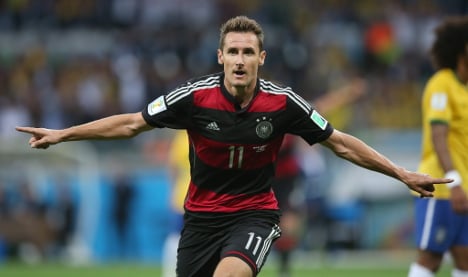The 36-year-old is the sole survivor from Die Mannschaft's last World Cup final in 2002 and is eager to taste victory at Rio de Janeiro's Maracana Stadium in his fourth World Cup finals.

The World Cup's top-scorer Miroslav Klose has threatened to abandon his strict fitness regime and become a "party animal" if Germany win Sunday's final in Brazil against Argentina.

The 36-year-old is the sole survivor from Die Mannschaft's last World Cup final in 2002 and is eager to taste victory at Rio de Janeiro's Maracana Stadium in his fourth World Cup finals.

Member comments